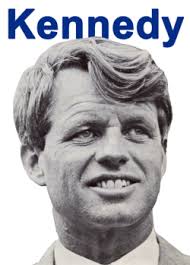
When the Kennedy family name is heard, most Americans tend to associate it with the famous John F. Kennedy, our nation's 35th president. However, while JFK's fame is well-deserved and he was one of the most influential presidents in U.S. history due to his handling of the Cold War, there is another Kennedy who did great things after the unfortunate passing of his brother and made big moves in our nation's politics: Robert F. Kennedy.
Growing in a wealthy family from Massachusetts, Robert Kennedy was educated in various elite private schools and pressured by his parents from a young age to pursue a successful career. Looking up to his father as a role model, Kennedy attended St. Paul's School and Milton Boarding School as a child before moving on to Harvard where he studied journalism. This field of study allowed him gain knowledge of national politics as he often had to collect information on current events and the state of the government in order to be successful in this subject. He also was skillful enough to make the university's football team where he was able to start most games and played as a defensive end. After his time at Harvard, Kennedy moved on to the University of Virginia School of Law and broadened his political knowledge even more greatly. This education allowed him to pursue a career in the political sphere and, combined with his publicity for being the brother of president John F. Kennedy, put in him a fantastic position to start a campaign for presidency in 1968.

When RFK decided to run for office in 1968, he did so on a platform based based on social justice, economic equality, and establishing calmed race relations in America. Similarly to his brother, JFK, Robert was of the Democratic Party and was highly liberal. He wanted to decentralize the power of the federal government and give the majority of power to individual states and also sought to use government spending on a large number of social improvements, showing the level of focus that he put into calming racial tensions. On top of this, Kennedy was also a large factor of using a very pacifistic style of foreign policy that he hoped would end the Cold War and prevent the United States from entering into any more large scale conflicts, leading him to promise an end specifically to the Vietnam War if he were elected.

During the early stages of his campaign, RFK reached success in four state primaries, including Indiana, Nebraska, South Dakota, and California. Moreover, Kennedy was the victor in three of the states in which he competed against his main opponent, McCarthy, showing that he had a considerable amount of support behind him that could give a chance at winning his spot in the oval office. Unfortunately, before he could ever become a primary candidate for the election, Kennedy was shot an killed by a Middle-Eastern assassin on the morning of June 5, 1968 while he was out meeting his supporters in Los Angeles, California. While he was not in a position to strongly contend for the presidency yet, this event marked a sad end to a potentially fantastic political career in the life of Robert Kennedy.
Sources:
http://www.history.com/topics/robert-f-kennedy
https://www.usnews.com/news/articles/2015/06/04/how-robert-f-kennedys-death-shattered-the-nation
http://www.4president.org/brochures/rfk1968brochure.htm
http://rfkhumanrights.org/robert-f-kennedy/
http://www.biography.com/people/robert-kennedy-9363052
Nice post, it's interesting to see more examples of powerful families in politics, like the Bush's. It's also interesting to see that he also got assassinated like his brother, even if he wasn't in a great position of power.
ReplyDeleteGreat post! I agree with Nathan that it's interesting to see the continuation of political dynasty's within America similar to the Bush's. Kennedy's have become one of the most influential and well known family's in America as a result of the popularity and legacy of both JFK and Robert Kennedy. I find it interesting that they both were liberals despite their rich upbringing. Robert's involvement as Attorney General during both JFK and Lyndon B. Johnson's administrations also would have largely contributed to his public popularity.
ReplyDelete